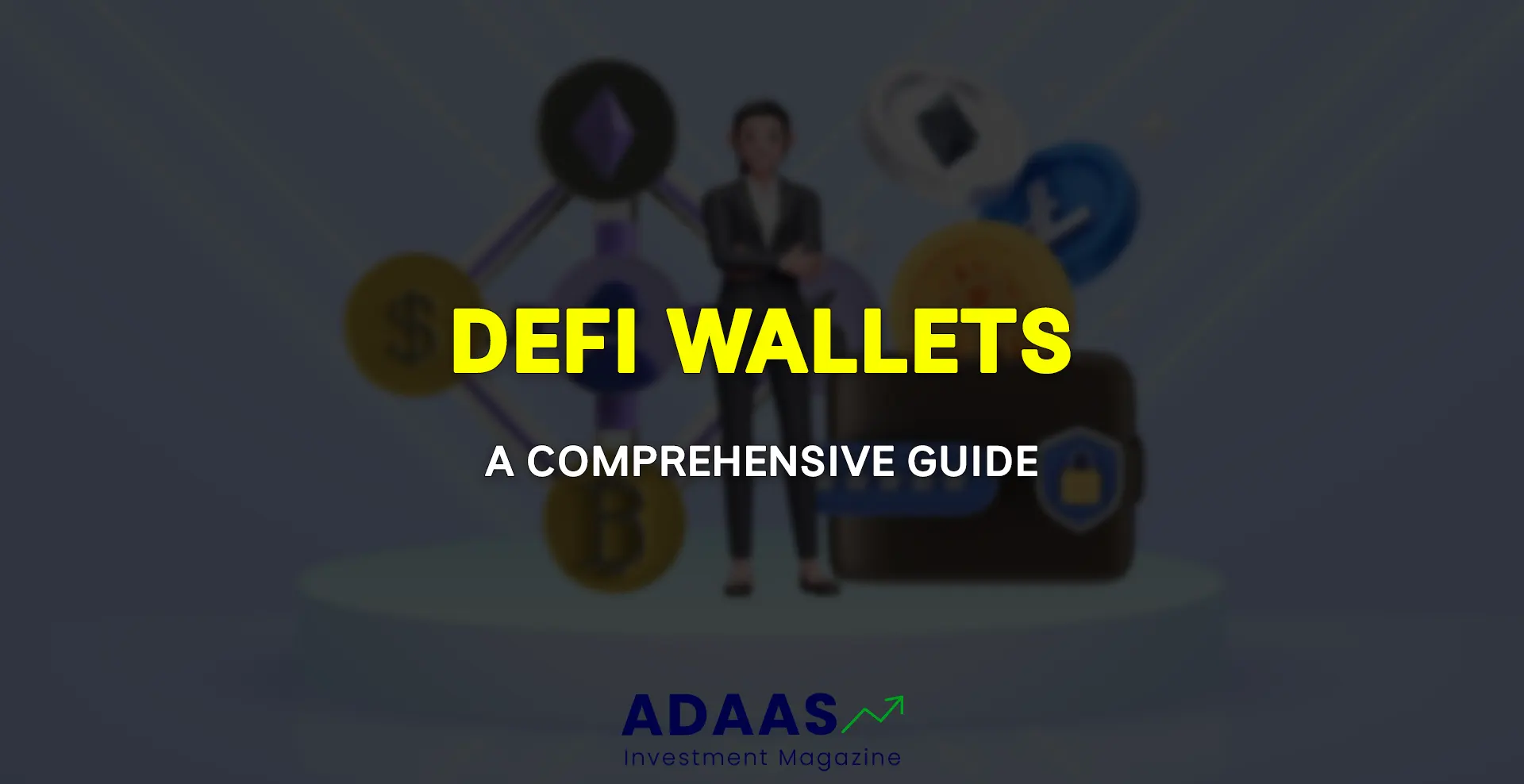What Is a DeFi Wallet?
Navigating the World of DeFi Wallets for Optimal Financial Independence
By reading the article “What Is a DeFi Wallet?” published in Adaas Investment Magazine, you will be fully familiar with the decentralized realm with our guide on DeFi wallets and understand their significance, explore types, and discover top choices for a secure and seamless financial future. This level of familiarity can be enough when you need educational information about this topic.
Decentralized finance (DeFi) is a revolutionary new financial system that is changing the way we think about money. Built on blockchain technology, DeFi offers a wide range of financial services without the need for intermediaries such as banks.
What is DeFi?
DeFi is a new financial system that is built on blockchain technology. It is a system that allows users to access financial services without the need for intermediaries such as banks. DeFi wallets are essential tools for participating in the DeFi ecosystem.
Why is DeFi important?
DeFi is important because it offers a number of advantages over traditional financial systems. DeFi is more open, transparent, and accessible than traditional finance. It is also more efficient and cost-effective.
What is a DeFi wallet?
A DeFi wallet is a digital wallet that allows users to store and manage their cryptocurrency assets. It also allows users to interact with DeFi applications and protocols. DeFi wallets are non-custodial, meaning that users are solely responsible for their own private keys and assets.
In this blog post, we have provided a brief explanation of DeFi, discussed the importance of DeFi wallets, and introduced some of the top DeFi wallets available today. We hope this information has been helpful. If you have any further questions about DeFi or DeFi wallets, please do not hesitate to leave a comment below.
Table of Contents
Understanding DeFi Wallets
A DeFi wallet is a digital wallet that allows users to store and manage their cryptocurrency assets. It also allows users to interact with DeFi applications and protocols. DeFi wallets are non-custodial, meaning that users are solely responsible for their own private keys and assets.
What is the purpose of a DeFi wallet?
DeFi wallets are essential for participating in the DeFi ecosystem. They allow users to:
– Store and manage their cryptocurrency assets
– Interact with DeFi applications and protocols
– Borrow and lend cryptocurrency
– Trade cryptocurrency
– Earn interest on their cryptocurrency assets
What are the advantages of using a DeFi wallet?
There are a number of advantages to using a DeFi wallet, including:
– Control over your own assets: Unlike custodial wallets, DeFi wallets give users full control over their own private keys and assets. This means that users are not reliant on a third party to keep their assets safe.
– Access to a wide range of DeFi applications and protocols: DeFi wallets allow users to interact with a wide range of DeFi applications and protocols, including decentralized exchanges, lending platforms, and yield aggregators. This gives users access to a wider range of financial services than they would have access to through traditional financial systems.
– Lower fees: DeFi wallets typically charge lower fees than traditional financial institutions. This is because DeFi applications and protocols are not subject to the same regulatory costs as traditional financial institutions.
How to choose a DeFi wallet
When choosing a DeFi wallet, there are a few key factors to consider:
– Security: The most important factor to consider is security. Make sure to choose a wallet with strong security features such as two-factor authentication and support for multiple signatures.
– Usability: Choose a wallet with a user-friendly interface that is easy to navigate.
– Compatibility: Make sure to choose a wallet that is compatible with the DeFi applications and protocols you want to use.
Types of DeFi Wallets + Top Wallets
There are three main types of DeFi wallets: hardware wallets, software wallets, and web wallets.
Hardware Wallets
Hardware wallets are the most secure type of DeFi wallet. They are physical devices that store users’ private keys offline. This makes them very resistant to hacking and other forms of theft.
Benefits of hardware wallets for DeFi:
– Extreme security: Hardware wallets store users’ private keys offline, making them very resistant to hacking and other forms of theft.
– Support for a wide range of cryptocurrencies and DeFi platforms: Most hardware wallets support a wide range of cryptocurrencies and DeFi platforms, giving users access to a wide range of financial services.
Top hardware wallets for DeFi:
Software Wallets
Software wallets are digital wallets that can be installed on a computer or mobile device. They are less secure than hardware wallets, but more convenient to use.
Types of software wallets:
– Hot wallets: Hot wallets are software wallets that are connected to the internet. This makes them more convenient to use than cold wallets, but also less secure.
– Cold wallets: Cold wallets are software wallets that are not connected to the internet. This makes them more secure than hot wallets, but also less convenient to use.
Benefits of hot wallets for DeFi:
– Convenience: Hot wallets are more convenient to use than cold wallets because they are connected to the internet. This means that users can easily access their funds and interact with DeFi applications and protocols.
– Support for a wide range of cryptocurrencies and DeFi platforms: Most hot wallets support a wide range of cryptocurrencies and DeFi platforms, giving users access to a wide range of financial services.
Top hot wallets for DeFi:
– MetaMask
– Exodus
Benefits of cold wallets for DeFi:
– Security: Cold wallets are more secure than hot wallets because they are not connected to the internet. This makes them a good option for storing large amounts of cryptocurrency.
– Support for a wide range of cryptocurrencies: Most cold wallets support a wide range of cryptocurrencies.
Top cold wallets for DeFi:
– Electrum
– Armory
There are a variety of DeFi wallets available, so it is important to choose the one that is right for you. Consider your individual needs and preferences when making your decision.
Features to Look for in a DeFi Wallet
When choosing a DeFi wallet, there are a few key features to look for:
Security Measures
Security is the most important feature to consider when choosing a DeFi wallet. DeFi wallets are non-custodial, meaning that users are solely responsible for their own private keys and assets. This means that it is important to choose a wallet with strong security features to protect your assets from theft or hacking.
Some important security features to look for include:
– Two-factor authentication (2FA): 2FA adds an extra layer of security to your wallet by requiring you to enter a code from your phone in addition to your password when logging in.
– Multi-signature support: Multi-signature wallets allow you to require multiple signatures to approve transactions. This can help to protect your funds if your wallet is compromised.
– Hardware wallet integration: Hardware wallets are the most secure type of cryptocurrency wallet. If you are storing a large amount of cryptocurrency, you may want to consider choosing a wallet that integrates with a hardware wallet.
User-Friendly Interface
Another important feature to consider is the user interface. DeFi wallets can be complex, so it is important to choose a wallet with a user-friendly interface that is easy to navigate. Look for a wallet that has clear and concise instructions, and that makes it easy to send, receive, and store your cryptocurrency.
Compatibility with DeFi Platforms
Finally, you will need to consider the DeFi platforms that you want to use. Not all DeFi wallets are compatible with all DeFi platforms. Make sure to choose a wallet that is compatible with the platforms that you want to use.
How to Ensure the Safety of Your Assets in a DeFi Wallet
In addition to choosing a wallet with strong security features, there are a few other things you can do to ensure the safety of your assets in a DeFi wallet:
– Keep your private keys safe: Your private keys are the keys to your cryptocurrency. If anyone else gains access to your private keys, they can steal all of your cryptocurrency. It is important to keep your private keys safe and secure. Never share your private keys with anyone.
– Be careful when interacting with DeFi applications: DeFi applications can be complex and risky. It is important to do your research before interacting with any DeFi application. Make sure you understand the risks involved before investing any money.
– Keep your software up to date: Software developers are constantly releasing updates to their software to patch security vulnerabilities. It is important to keep your software up to date to protect your assets from known vulnerabilities.
By following these tips, you can choose a DeFi wallet that is safe and secure. Remember, security is the most important factor to consider when choosing a DeFi wallet.
Conclusion
DeFi wallets are essential tools for participating in the DeFi ecosystem. They allow users to store, manage, and interact with their cryptocurrency assets in a decentralized way. When choosing a DeFi wallet, it is important to consider security, usability, and compatibility with DeFi platforms.
Essential features of DeFi wallets:
- Security: DeFi wallets should have strong security features such as two-factor authentication, multi-signature support, and hardware wallet integration.
- Usability: DeFi wallets should have a user-friendly interface that is easy to navigate.
- Compatibility: DeFi wallets should be compatible with the DeFi platforms that you want to use.
Making an informed choice in DeFi:
Before choosing a DeFi wallet, it is important to do your research and compare different wallets. Consider the essential features listed above, as well as your own individual needs and preferences.
Explore the world of DeFi wallets:
The world of DeFi wallets is constantly evolving. New wallets are being developed all the time, and existing wallets are being updated with new features. Stay updated on the latest developments by following DeFi news and blogs.
We encourage you to explore the world of DeFi wallets and find one that is right for you. With so many different wallets available, there is sure to be one that meets your needs.

The End Words
At Adaas Capital, we hope that by reading this article you will be fully immersed in DeFi Wallets! You can help us improve by sharing this post which is published in Adaas Investment Magazine and help optimize it by submitting your comments.
FAQ
What is the difference between a DeFi wallet and a normal wallet?
The main difference between a DeFi wallet and a normal wallet is that a DeFi wallet is non-custodial, meaning that the user is solely responsible for their own private keys and assets. A normal wallet, on the other hand, is typically custodial, meaning that the wallet provider holds the private keys and assets on behalf of the user.
Is DeFi wallet a crypto wallet?
Yes, a DeFi wallet is a type of crypto wallet. It is a digital wallet that allows users to store, manage, and send cryptocurrency assets. DeFi wallets are non-custodial, meaning that the user is solely responsible for their own private keys and assets.
Is MetaMask a DeFi wallet?
Yes, MetaMask is a DeFi wallet. It is a non-custodial, software wallet that allows users to store, manage, and send cryptocurrency assets. MetaMask is also a gateway to the decentralized finance (DeFi) ecosystem, allowing users to interact with DeFi applications and protocols.
Can you withdraw from DeFi wallet?
Yes, you can withdraw from a DeFi wallet. DeFi wallets are non-custodial, meaning that you have full control over your funds and can withdraw them at any time.





